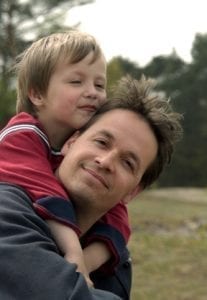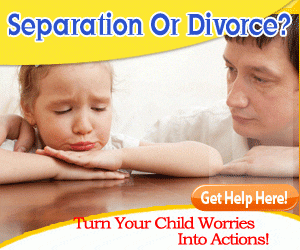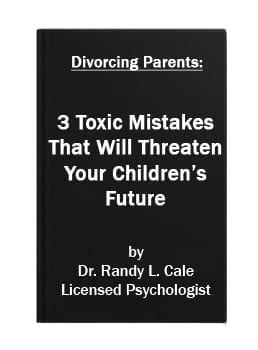2. EDUCATE YOURSELF ABOUT CO-PARENTING AFTER DIVORCE.
 By co-parenting after divorce, I am referring specifically to the strategies that have to do with handling children in two households. This includes everything from routines, times-sharing, phone calls, and communications between parents. This is no therapy. The focus is on establishing agreements about how to most effectively handle the children.
By co-parenting after divorce, I am referring specifically to the strategies that have to do with handling children in two households. This includes everything from routines, times-sharing, phone calls, and communications between parents. This is no therapy. The focus is on establishing agreements about how to most effectively handle the children.
You really have three options when it comes to co-parenting.
Best: Convince your ex-partner to work conjointly with you in a co-parenting process. Both of you could meet jointly with a therapist in their office, or you could conduct this type of work by telephone.
In essence, this is a form of parent coaching that is highly driven by practical input. A psychologist that has experience in this area will be able to give firm, direct guidance with regard to the kinds of strategies that are effective and healthy for children in a post-separation world.
By using this type of professional guidance, you will be able to tailor an individualized co-parenting plan that is best for your family.
Better: Attend a course on co-parenting, and take careful notes. Find all of the resources and information possible on co-parenting, and master this information.
 Then convince your ex-partner to co-participate in this type of course. At a minimum, give them materials to read, and then ask them to set times to discuss this information with you.
Then convince your ex-partner to co-participate in this type of course. At a minimum, give them materials to read, and then ask them to set times to discuss this information with you.
Set specific times to get together with your ex, and develop a strategy of co-parenting. In many cases, you can do this. Find parents who have been successful at co-parenting, and learn from them. Be cautious of those parents who are consumed with their own anger, and insist that they are the only ones who “know what’s in the kids best interest.” Too often, emotions blind judgment…and such toxic individuals can corrupt your view of how to co-parent effectively.
I have authored a co-parenting manual for parents focused exclusively on the issues of co-parenting after divorce. The manual, Terrific Parenting Through Divorce: Keeping Kids First, is a revised version of the manual used in the co-parenting program my partners and I taught for over ten years in the Albany area.
This manual is a powerful guide, showing parents the specific ways in which they can buffer their children from the impact of divorce. Not only will the reader gain insight into what factors impact children, but they also will be equipped to develop a co-parenting plan which helps to insulate their children from the debilitating challenges of living in two households.
For many parents, you’ll find that the Terrific Parenting Through Divorce: Keeping Kids First manual provides a comprehensive blueprint for structuring your own individualized co-parenting arrangement. If you find yourself wanting answers to specific questions, you may want to consult with Dr. Cale by phone [ Contact Dr. Cale ], or find an expert in your area who specializes in divorcing families.
The Topics Covered Include:
- How parents handle and mishandle divorce.
- Ways to handle your intense emotions, and resolve pain
- Strategies for talking to kids
- Impact of divorce on children.
- Role of key players, such as grandparents, lawyers, courts.
- How to stay focused on what you can control.
- Ways to stay calm and focused during exchanges.
- Ways to help kids cope with the many changes.
- How to help children with difficult exchanges.
- What tools you can offer children.
- Resources to help you and your children.
- And more.
Please consider this valuable program, as your satisfaction is guaranteed. If interested, you can order this program here: Click here for Terrific Parenting Through Divorce: Keeping Kids First.
 Good: Under very difficult circumstances, there are times when the other parent will not communicate with you. Under these circumstances, learn all that you can about co-parenting. Take all the steps that you possibly can to protect your children and implement these consistently and regularly.
Good: Under very difficult circumstances, there are times when the other parent will not communicate with you. Under these circumstances, learn all that you can about co-parenting. Take all the steps that you possibly can to protect your children and implement these consistently and regularly.
In other words, do everything that you can to effectively parent with that part of your children’s lives that you do have control over. Make certain that everything that you do in your home and in the kids’ lives is healthy and beneficial for your children. Again, educate yourself. Consider participating in a divorce education program…even if your ex refuses. Be more focused on what you can control…and begin to put less energy into decisions out of your control.
In this type of situation, you may have little to no control over what your ex is doing. You may have no influence over what your ex says or does with the children. All that you do have control over is what you do in response to what your children present you. That is where you must focus your attention. That is where you must focus your energy. That is where you must become an exquisite parent.
3. BECOME A MASTER AT PARENTING (I.E., Understanding How You Have Influence With Your Children)
When you do this, tensions and conflicts are reduced.
 What I am referring to are the fundamentals of parenting. I am referring to learning how you have influence over your children’s behavior. I am referring to how you develop a strong and enduring relationship with your children. And I am referring to how you create healthy, responsible children who enjoy being a part of their family.
What I am referring to are the fundamentals of parenting. I am referring to learning how you have influence over your children’s behavior. I am referring to how you develop a strong and enduring relationship with your children. And I am referring to how you create healthy, responsible children who enjoy being a part of their family.
In essence, this means that you do not leave parenting to chance. You do not rely upon the advice of neighbors or family members. You do not get your input from a newspaper columnist.
Instead, you seek out the best help that’s available, and use it to obtain the tools that it takes to shape your children’s behavior effectively.
If you reviewed the pages on the ” Essential Parenting Home Study Program ” that are available, then you’re probably aware of some of the tools and strategies that are available. You can also get valuable information from other portions of this website that cover specific problems you may be having with your children. You can also get tons of valuable information, including state-of-the-art parenting input, by subscribing to Dr Cale’s free email newsletter, ” Terrific Parenting Newsletter.”
Lastly, it is important to note that difficult situations may require more personalized attention. You may feel that you need face-to-face guidance. If you feel your situation warrants this, seek out an expert in your area. Find a psychologist or therapist with years of experience in this area, as this will greatly reduce your learning curve.
4. AVOID LITIGATION …IF AT ALL POSSIBLE.
Many parents do not appreciate the powerfully disabling impact of toxic litigation on children. During the divorce process, parents can easily get lost focused on the choices of their ex-partners, and lose sight of their choices.
We know that this is something all humans are vulnerable at doing. Under conditions of intense emotion, our energies tend to move toward protection of self and family. When we do so, our focus tends to go toward events out of our control…and we then take less responsibility for decisions that ultimately lead to litigation.
Keep talking. Find a mediator…a good mediator…who will make certain you both to be an active part in the decision making. The research is clearly on the side of your children…when you work things out without prolonged litigation. On the other hand, you put your kids at heightened risk when you engage in extended litigation.
Why? Because…it impacts you…it impacts the quality of communications…it impacts the demands upon kids…it impacts the intensity of parental emotion that kids must now absorb…and the list could go on.
Bottom line:
DO YOUR BEST TO AVOID LITIGATION… AND YOU’LL HAVE MORE ENERGY LEFT FOR YOUR KIDS.
Don’t Forget to get your free report, and 15 co-parenting principles that protect your children.

 ** Please double check for accuracy. Your privacy is SAFE. We will NEVER sell/rent/give away your information.
** Please double check for accuracy. Your privacy is SAFE. We will NEVER sell/rent/give away your information.













